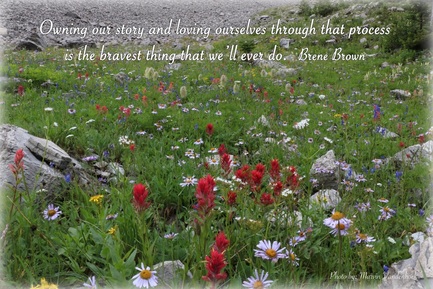Theoretical Perspective of Counselling
|
My main theoretical perspective of counselling blends person centred theory with existential philosophy. When counselling is viewed from this premise, clients’ existence, as well as what is done with this existence become central themes (Milton, 1993).
The person centred therapist will place emphasis on responsibility, or what is often termed self-actualization, enabling clients to be more open to experience, to trust themselves, have an internal locus of control, as well as continue to grow. Techniques used to bring this about are listening, accepting, understanding, and sharing (McLeod, 2008). Counsellors engage clients on their own level, empowering them to make their own choices. These choices are based on their individual values, as well as what gives meaning in their lives. |
In a similar way, existential therapists strive to create “increased awareness” in clients (Corey, 2009). This enables clients to find other possibilities in life that they didn’t see before. They are led down a path in which they realize that they have the power and the responsibility to make change happen.
I believe people have the innate capacity to fulfill their own potential. My goal as a therapist is to build a non-judgmental and empathic relationship with clients that will empower them to discover their identity, find meaning in their lives, and create the change they want for themselves in relation to the world around them.
Acceptance and mindfulness strategies are used extensively in my practice to help clients appreciate themselves, as well as embrace emotional honesty. Clients learn to view themselves in the context of their problems, not as problem themselves. Clients are encouraged to engage in self-compassion and self-care between sessions.
I believe people have the innate capacity to fulfill their own potential. My goal as a therapist is to build a non-judgmental and empathic relationship with clients that will empower them to discover their identity, find meaning in their lives, and create the change they want for themselves in relation to the world around them.
Acceptance and mindfulness strategies are used extensively in my practice to help clients appreciate themselves, as well as embrace emotional honesty. Clients learn to view themselves in the context of their problems, not as problem themselves. Clients are encouraged to engage in self-compassion and self-care between sessions.
Corey, G. (2009). Theory and practice of counseling and psychotherapy (8th ed.). S.l.: Brooks/Cole.
McLeod, S. (2008). Person Centred Therapy - Simply Psychology. Retrieved from http://www.simplypsychology.org/client-centred-therapy.html
Milton, M. J. (1993). Existential thought and client centered therapy. Counselling Psychology Quarterly, 6(3), 239.
McLeod, S. (2008). Person Centred Therapy - Simply Psychology. Retrieved from http://www.simplypsychology.org/client-centred-therapy.html
Milton, M. J. (1993). Existential thought and client centered therapy. Counselling Psychology Quarterly, 6(3), 239.

